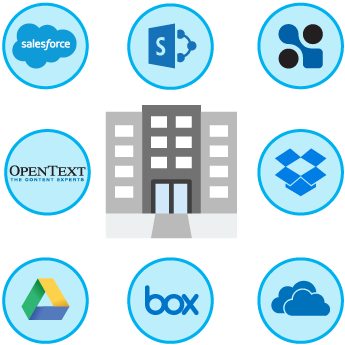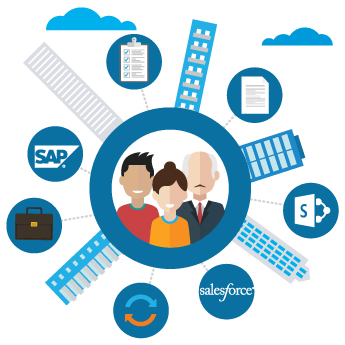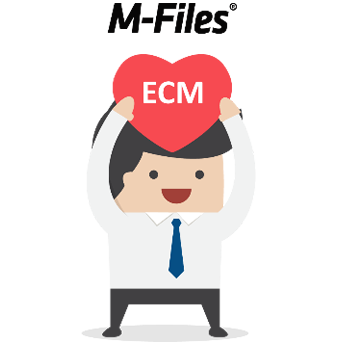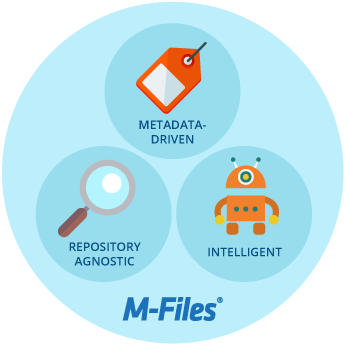Too many information silos.
Managing business information is more complex than ever. The amount of data is exploding and it is often stored in different systems or scattered across shared network drives and mailboxes, making it difficult to find and manage. Different interfaces and applications drastically reduce productivity.
Managing documents and information is often chaotic, complicated and requires a lot of IT resources. And the bigger the organisation, the worse it is.
Recognisable? Read on and find out how intelligent information management solve these challenges.
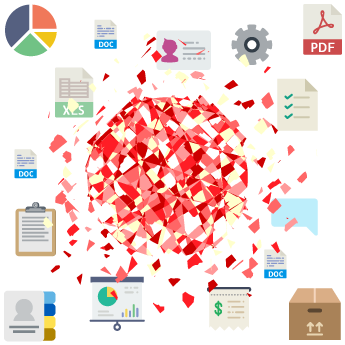
Another system is not the answer.
Organisations use many applications and solutions where documents are created and stored. These can range from shared network drives to ECM systems such as OpenText or Documentum, as well as fileshare solutions such as SharePoint, Box and Dropbox. Some are on-premise and some in the cloud. The larger the organisation, the more complex it becomes. Adding another application only makes it worse.
What if you could easily find information you need across different systems and applications? Where you could also enrich the information, without disrupting existing processes and systems?
One size fits none.
Choosing an information management system (ECM) is usually a top-down decision that is monolithic. Which means that everyone in the organisation has to adapt to the application. This requires changes and these are accompanied by resistance and inhibit innovations.
What if it were possible to enable departments to use information to suit their own ways of working? M-Files is a platform that can be freely set up to suit the working practices of individual departments, teams and even individuals.

No need to migrate.
One of the biggest stumbling blocks to implementing a new information management (ECM) system is data migration. How do you get all your existing data into the new system? It is complex, time-consuming and expensive.
What if you don't need to migrate anything at all?
Raging Google-like search.
Whether you search for music on Spotify or a website via Google, it happens at lightning speed without you knowing beforehand where that information goes. With M-Files, you find documents and information in this same way, ensuring that your 40% spend less time searching for information.
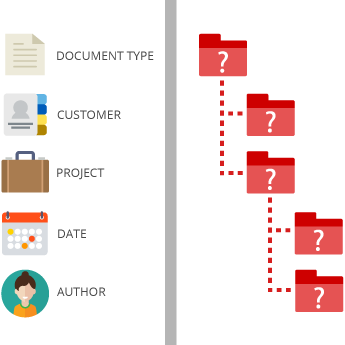
What versus where.
Traditional information management is based on where information is stored, in which folder, library, disk or site. And with multiple systems, this problem increases exponentially. M-Files' approach is based on the what of information, such as the context, relationship and relevance of information. This is done using metadata.
Read also Metadata explained using Netflix and Spotify.
Connects data and documents.
ECM systems have traditionally focused on managing documents and other content: contracts, quotations, invoices and so on, often referred to as 'unstructured data'. But other business applications (CRM, ERP, HR etc.) also contain important information (structured data), such as data and information about customers, employees, projects, invoicing, sales and much more. With M-Files, you connect this data from other applications to documents, creating a 360 degrees image around a file, project or client.

The intelligent metadata layer (IML)
The new generation of information management (ECM) is much more than just a place to store and process information; it uses an open architecture (e.g. RESTFul API) that supports best-in-class analytics (BI), Natural Language Processing (NLP) and machine learning. A powerful new metadata-based approach creates a "Intelligent Metadata layer" that unifies multiple systems and repositories based on context, while keeping actual content and data in place and not disrupting existing systems and processes.
Information is classified and automatically organised and the system is increasingly adapting based on key statistics and user behaviour.
The new approach to information management is easy, dynamic and smart, and M-Files is leading the way! Sounds interesting right? Click below to request a live demo.
Manage documents & information like never before.

